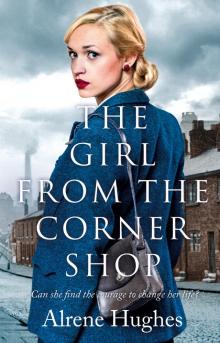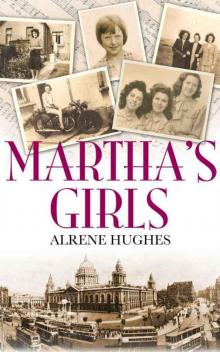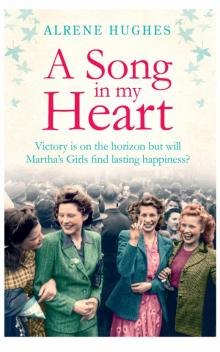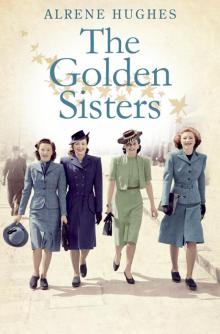- Home
- Alrene Hughes
A Song in my Heart Page 14
A Song in my Heart Read online
Page 14
Pat and Peggy watched her go, stunned at the conversation they’d just had. Eventually, Peggy shook her head. ‘You realise there’s another reason why she can’t join the WAAF, don’t you?’
Pat’s face was blank.
‘Because that’ll be the end of the Golden Sisters.’
Pat looked at her in disbelief. ‘The Golden Sisters. Is that all you can think of? Never mind that – what’s Mammy going to say?’
Chapter 18
Martha lay on the truckle bed under the eaves listening to the little noises her grandson made as he woke. She could tell that Irene was still sleeping by the sound of her breathing so she got up, dressed quickly and went to the crib. Alexander’s eyes were open and his mouth moved as if he was speaking to her. Martha picked him up, wrapped the blanket around him and carried him downstairs. Over the past month it had become their morning routine, an hour when he was all hers. She changed his nappy, gave him a bottle and all the while she talked to him. He was an intelligent child – she’d seen that in his eyes the first time she saw him. Of course, he didn’t understand the words, but he was soothed by her voice and knew that he was safe and loved. She rocked him in her arms or carried him around the room and all the while she would tell him stories about his family: his mother, his aunts, his grandfather and the great city where they lived.
She told him that on the morning of his christening they were going to church and lots of people would come to see him. Aunt Pat would be there because she was going to be his godmother and his gran had made a beautiful shawl just for him – a family heirloom. She laid the child on her lap, his head resting on her knees as she gazed at his beautiful face. The thought of leaving him was a physical ache that brought tears to her eyes.
She had tried so hard to persuade Irene to bring the child home where he belonged. She had pleaded, argued and wept but Irene, stubborn as ever, wouldn’t be moved. Oh, she could see the way of it, she understood Irene’s decision. ‘This is my family now – Sandy, Alexander and me,’ she had said, but the words had cut Martha to the quick.
Martha always knew Sandy was a good man, and over the past month when she saw him with Irene and Alexander she could see the love in his eyes. He would be watching Irene with the baby and she would look up and catch him looking at her and right then Martha knew that Irene and the baby didn’t need her.
She had decided that she would leave after the christening and travel back to Belfast with Pat. ‘Ach Mammy, why don’t you stay a bit longer?’ Irene had said, and Martha knew that she genuinely meant it, but it was time for her to go.
The christening was held in Enniskillen Methodist Church in the centre of the town, an imposing building with a portico of four elegant columns. Little Alexander, in his much-admired shawl, didn’t cry when the water from the font was trickled over his head. Pat had brought gifts from everyone, including a silver napkin ring from Aunt Kathleen engraved with the baby’s initials. She also brought a camera, borrowed from Jack their next door neighbour, and she used up the whole film taking photographs of Alexander and the guests.
On the train home, Martha stared out the window and said very little. Pat thought it best to let her be for a while, but after half an hour she had to say something.
‘Mammy, you can’t be upset about Irene living in Fermanagh. You know that, don’t you?’
‘I’ll be upset if I want.’
‘You can visit her again, maybe in the summer.’
‘I know that – I’m not stupid.’
‘You need to think about yourself more. You’ve looked after all of us so well … I’m just saying there are so many things you could be doing, that you’d enjoy doing, without the worry of us.’
Martha looked at Pat as if she was mad and went back to gazing at the passing countryside. Pat could feel the tension emanating from her mother and said no more. Shortly after that, the train slowed as they came into a station and the guard walking the length of the platform shouted, ‘Dungannon’. Martha watched the people get off then suddenly she stood up and grabbed her bag from the luggage rack.
‘What are you doing?’ asked Pat.
‘I’m getting off.’ She leant out of the window and opened the carriage door.
‘You can’t get off here.’ But Martha was already on the platform and walking away. ‘I’ll come with you!’ Pat shouted after her.
Martha stopped dead in her tracks and half-turned towards her daughter. ‘No, you won’t. I’m doing something I’ll enjoy for once.’
‘What? What are you going to do?’ said Pat, and at that moment realised where her mother was going and sank back into her seat. The stationmaster closed the carriage door, blew his whistle and waved his flag, and the train pulled out of Dungannon station.
Up the hill and into the square, everything was just as Martha remembered it. Hard to believe it was two years ago that she had come to the town as a stranger looking for her daughter. How desperate she’d been that day. Sheila had been evacuated from Belfast and because of a series of misunderstandings Martha had heard nothing from her, and all attempts to find her through the authorities had failed. Frantic with worry, Martha had travelled to Dungannon and found Sheila, alive and well, living with the McManus family. Now here she was again in front of their shop, Frank McManus and Son, High Class Butchers and Slaughtermen, and memories of that bittersweet summer she and Sheila had spent with the family filled her head.
She had kept in touch with Bridie McManus, writing every few months, and their friendship had grown. Indeed, Bridie finished every letter with an invitation to come and stay with them again.
Do something you would enjoy, Pat had said. Well, she had only to cross the square.
Rose, Bridie’s daughter, was in her usual place behind the counter and glanced up as the shop bell rang. Not a regular customer this woman in a felt hat, carrying a suitcase. Then she looked again. ‘My goodness, is it you?’ she shouted and ran from behind the counter to shake Martha’s hand. ‘Is Sheila not with you?’ Without waiting for an answer she called out, ‘Ma! Come and see who’s here.’
The door at the back of the shop leading into the house opened and Bridie McManus, a large woman with a laboured gait, filled the doorway. ‘Lord bless us all, Martha Goulding as I live and breathe. Come on in,’ she said and led the way into the warm, cluttered kitchen. For a moment Martha was at a loss to explain why she was there. How could she turn up on the doorstep and expect a family to put her up? But she needn’t have worried. Bridie saw the suitcase. ‘Ah, you’ve come to visit us at last, have you? How long can you stay?’
‘For a couple of days, if that’s all right?’
‘Of course it is. Stay as long as you like, if you don’t mind being in that wee house out in the yard. Remember, where you and Sheila slept? It’ll need a bit of a clean but—’
At that moment, there was the cry of a baby from upstairs. ‘That’ll be Celia awake,’ said Rose. ‘I’ll go and get her.’
Martha’s eyes lit up. ‘So you’re a grandmother at last, Bridie.’
‘Indeed I am and what about your Irene?’
‘She has a wee boy, Alexander, born in Fermanagh a month ago. I’ve been down staying with her and I was on my way back to Belfast when I decided to come and see you.’
‘Ach, I’m so glad you did. Both of us grandmothers now and plenty to catch up on. Tell you what, away you across the yard and get yourself settled while I see to the baby and make us somethin’ to eat.’
The little whitewashed cottage was exactly as Martha remembered it. Just one room: hard earth for a floor; an open fire and next to it a bed. A place of her own for a while and time to think through the turmoil in her head.
Later, the two women sat in front of the fire with cups of strong tea and thick roast beef sandwiches, the like of which Martha hadn’t seen since she was last in Dungannon and staying in a butcher’s shop. While Celia dozed on Bridie’s ample bosom, they talked about their grandchildren and before long Bridie, her head on
one side, looked hard at Martha.
‘God, it must have been a terrible wrench for you to leave that wee boy.’
Martha opened her mouth to deny the suggestion. It was not in her nature to share personal feelings, but the tears pricked her eyes when she tried to speak and it was a sob that escaped her lips. Bridie let her be and sat quietly. Martha wiped her eyes and gave herself a bit of a shake.
‘I’m sorry, Bridie, I don’t know what’s the matter with me. But you’re right, saying goodbye to the child was hard.’
‘I know. Sure, you’d want to be a part of their lives and not be so far away.’
Martha stared at the fire. The turf shifted and sparks flew and died. ‘They don’t need me,’ was all she said.
‘Oh, they do need you, but not the same as before. They have to make their own way and they want you to be watching and proud of what they can do for themselves. And if something’s not right, sure it’ll be you they’ll seek out for help, mark my words.’
Martha sighed. ‘When I left Fermanagh, I didn’t know what to do; I was at my wits’ end. I couldn’t face going back to that house of mine and the cooking and the cleaning. That’s all those girls want me for. They’re out all the time gallivanting here, there and everywhere with the singing, coming home in the dead of night and me lying there for hours worrying like an eejit.’
‘I’m telling you, Martha, what you need is a wee break in the country with good food, good company and nobody to think of but yourself.’
Together they washed the dishes and the talk turned to Sheila. ‘Ach, she’s a great wee girl,’ said Bridie, ‘and no trouble at all to keep. We missed her when she went, Dermot especially.’
‘They were a bit sweet on each other, weren’t they?’ Martha smiled.
‘And now you’re telling me she’s engaged.’
‘Thanks be to God for small mercies,’ said Martha. ‘She was a bit unsure, but in the end she took my advice. Young fellows like Charles don’t come along very often. He’s training for the teaching you know, musical too, and he dotes on our Sheila.’
‘Well, there you are now, that’s something to please you. Talking about good prospects, you’ve not asked me about me brother?’
Martha could feel the heat rising inside her and she hoped it wouldn’t send one of those awful hot flushes across her face. ‘I … I was just about to ask. How is Vincent?’
Bridie laughed. ‘Would you believe it, he’s courting a woman, a spinster, close to his age. She’s a nurse at the cottage hospital, met her when he cut his hand badly on the flax.’
Martha picked up two plates and concentrated on drying them, not daring to look at Bridie who carried on chatting about the nurse. Martha heard not a word; she was too busy pushing aside an emotion she didn’t recognise, but which threatened to overwhelm her. She couldn’t let Bridie see her cry again, especially not over Vincent. Dear God, she thought, what’s the matter with me? But the memory of that day with Vincent when he took her out in the pony and trap flooded back. She had known that he had feelings for her and she let herself be kissed, let him confess his love. But her heart had been too set in her widow ways and she couldn’t respond. She had cherished that memory ever since, that feeling of being loved, but now it was spoiled and he loved another.
‘Our Vincent had a bit of a notion for you, didn’t he, but sure that wasn’t to be. You’re a Belfast woman through and through, Martha. You’d never have settled in the back of beyond.’
Chapter 19
In those early days of May, Martha fell into a routine to fit around the McManus family. She would wake early in her cottage and cross the yard to make a batch of soda bread for their breakfast. After that she would go for a long walk, striking out towards some neighbouring village and returning at dinnertime. She offered to serve in the shop so that Rose could spend more time with Celia and, after a few days learning the cuts of meat and how to use the bacon slicer, she was behind the counter each afternoon. In the evenings she sat a while with Bridie talking and doing a bit of sewing and went early to bed. With each day that passed, Martha felt her agitation and tendency to tears fade. She wrote to her girls to say she was fine and enjoying her visit to Bridie’s and told them the weather was good, so she might stay another week or so. She almost added an instruction to make sure the house was cleaned and the vegetable garden weeded, but she didn’t.
She began to think of the morning walks as a sort of spring cleaning of her mind – each aspect of her life like a room – discarding things no longer needed, polishing precious things and rearranging it all to make it seem fresh and new. One morning she sat on a low hill with a view across to the Sperrin Mountains and sifted through her thoughts about the war – the hardships and sadness and fear – trying to make sense of what she and her family had been through. They had come a long way and they weren’t through it yet, but since the Americans joined the fight it was clear that the war would be won eventually. Life would return to normal, they’d have enough to eat, coal to keep them warm, decent clothes to wear.
On some walks she’d think of her daughters and try to put away her frustrations with them to concentrate on everything that she loved and admired about them. In her mind, she’d step back and look at them. Aye, they were good girls, right enough. And what of herself, what should she let go of? What did she have to cherish? Did her life need to be rearranged?
On a perfect morning, with a huge blue sky and the sound of birdsong, she stopped to lean on a five-bar gate and take in the land that stretched for miles on either side of the hawthorn hedgerows. Little hills, drumlins, sat like pebbles scattered across the landscape, with a patchwork of tiny fields undulating up and over them. Martha opened the gate and walked through the green shoots of unripe oats. Close to the edge of the field stood a magnificent sycamore tree. She realised she knew this place, had been sitting underneath that sycamore when she first met Vincent three summers before.
Bridie was right about Martha, of course. She would never have settled on a farm, never have left her girls for a man. She knew that herself when he courted her; knew the moment he declared his love that she would say no. But Vincent’s love and that igniting of desire within her was something to be cherished – it was the first time since she was a young woman that she had felt such a yearning.
Martha was happy to admit she had always been a woman who was plainly dressed, some might say a little old fashioned. When she left Belfast to visit Irene, Peggy had insisted she take something ‘a bit dressier’, as she put it, for the christening. She tried on a few of the girls’ dresses and finally decided on a cotton print with soft green leaves. It had a revere collar, like a blouse, a thin belt and the skirt was slightly flared.
‘My goodness,’ said Pat when Martha tried it on, ‘it takes years off you.’
‘Not mutton dressed as lamb?’
‘No, of course not – it’s suitable for a woman of your age. I’d tell you if it wasn’t.’
And Martha had enjoyed wearing the dress for the christening, and the compliments she received. Now, she had an opportunity to wear it again to a hooley – a going-away party for Bridie’s nephew who was leaving to work in America.
‘It’s a chance to say goodbye to the boy,’ Bridie told her. ‘Who knows when he’ll be back, if ever. There’ll be a bit of food and a few drinks. It’ll be great craic.’
The house was a good size, double-fronted with a garden out the back. There were already lots of people there when they arrived and many of them acknowledged Martha. Some recognised her as the woman from Belfast who had stayed with Bridie before, while others knew her from serving in the shop. They were such friendly people, with plenty of chat and good humour, that she felt quite at home. There was a fine spread of food and Bridie’s husband Frank had brought a big ham and a side of roast beef to carve. Martha spotted Vincent and went to say hello to him. He seemed a little shy, but she asked how he was and he told her that he was grand and was walking out with a lady.
&nb
sp; ‘I know – Bridie told me and I’m really happy for you, Vincent.’
‘Will ye come and meet her?’ he said. ‘She’s out in the garden.’
Mary was a bonny-looking woman with a ready smile and it was clear she was smitten with Vincent. Martha could plainly see their happiness at finding one another and she wished them well. It didn’t sadden her that she had no one – instead it warmed her heart to know that Vincent had found someone who would return his love.
The music began and, like all good hooleys, there was plenty of dancing and Martha didn’t want for partners. If her daughters could have seen her dance the jigs and reels, heard her laughter as she was spun faster and faster, they would have been amazed. Never mind a different dress, a different outlook on life had taken years off her.
Soon it would be June and Martha began to wonder whether the grass in her garden would be knee high and whether the honeysuckle had climbed over the lean-to shed filling the evening air with scent. She loved being in Dungannon, but she missed her girls and now it was time to go home.
The night before Martha left she sat with Bridie in the kitchen drinking tea, the two of them putting the world to rights. ‘Unsettled times we’re livin’ through,’ said Bridie. ‘And the young ones’ll bear the brunt of it. But you can’t tell them anything. They think we know nothin’, but sure haven’t we seen it all before?’
‘You want to save them from making the same mistakes we did,’ Martha said, ‘but you can’t, can you?’
They sat in silence a while nursing their tea, then Martha looked up and said, ‘Do you still read the tea leaves, Bridie?’
‘Aye, sometimes.’
Martha handed Bridie her empty cup. ‘There you are, then. What can you see for me?’

 The Girl from the Corner Shop
The Girl from the Corner Shop Martha's Girls
Martha's Girls A Song in my Heart
A Song in my Heart Golden Sisters
Golden Sisters